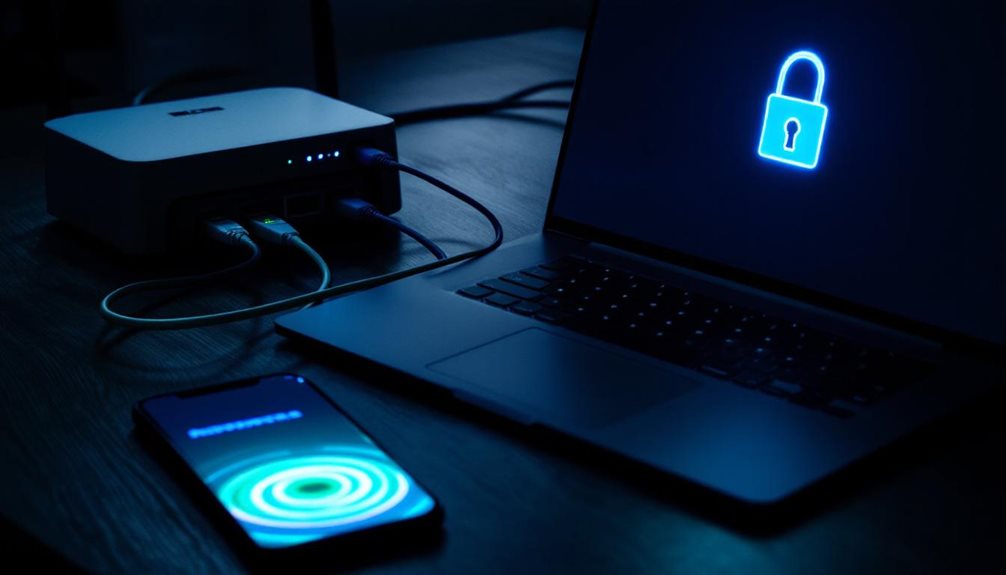A VPN, or Virtual Private Network, creates secure internet connections by encrypting data and hiding users’ IP addresses. This tool is essential for enhancing privacy and security whilst browsing or accessing sensitive information, especially on public Wi-Fi. Users benefit from improved online safety, protection against cyber threats, and the ability to bypass geo-blocked content. With various types of VPNs available, individuals can choose one that suits their needs. Uncovering the right option can make a significant difference in online protection.
Understanding VPN Technology
Understanding VPN Technology
Grasping VPN technology can feel like stepping into a digital fortress, designed to protect users in the vast and often unpredictable terrain of the internet. At its core, a VPN employs tunnelling protocols to create secure connections over untrusted networks, encapsulating data to guarantee safety. VPNs achieve security through network tunnelling protocols that may implement encryption, providing reduced costs and greater flexibility for remote workers compared to dedicated lines. Additionally, VPNs ensure secure internet access for users, safeguarding sensitive information and acting as a shield against cyber threats.
Encryption plays a key role, utilising strong standards like AES-256 to guard information during its expedition. This technology not just masks original IP addresses, making users virtually invisible, but also allows remote access to resources, whether for individuals or companies operating across South Africa’s diverse regions. With features like kill switches for extra security, VPNs facilitate safe browsing and data protection, enabling South African users to traverse the online world with confidence and confidentiality whilst accessing local banking services, streaming local content, and maintaining privacy from data retention policies. For KZN businesses specifically, VPN services create encrypted links between multiple office locations, enabling safe file sharing and collaboration across different sites with minimal latency.
Key Benefits of Using a VPN
In today’s online environment, using a VPN can feel like having a reliable shield against the myriad threats lurking on the internet. The key benefits of VPNs include improved security, with 49% of users prioritising it as their main reason for adoption. Many prefer paid services, which offer stronger protection through military-grade encryption and no-logs policies.
Privacy is also a significant factor, as 40% employ VPNs to safeguard their data, especially on public Wi-Fi networks in places like shopping centres, airports, and coffee shops across South Africa. Additionally, 63% of respondents indicate that they currently use or have used a VPN, showcasing the growing acceptance and recognition of these services. Furthermore, the VPN market is projected to exceed $92 billion by 2027, highlighting the increasing demand for secure online access.
Moreover, VPNs help bypass internet restrictions, enabling access to geo-blocked content and international streaming services. With affordable subscription options available to South African consumers, and increased usage during the COVID-19 pandemic when remote work became essential, the value of VPNs continues to gain recognition amongst users for both personal and professional activities.
Types of VPN Services
Exploring the landscape of VPN services reveals a rich variety designed to cater to different user needs and preferences. South African users can choose from privacy-focused VPNs with stringent no-logs policies, speed-orientated options minimising download impact, cost-effective plans offering free trials, high-capacity services supporting multiple devices, or streaming VPNs adept at bypassing geo-restrictions. Each type serves a distinct purpose, ensuring users find the perfect match for their online activities. Notably, NordVPN is recognised as the best VPN for most users, offering a combination of speed, security, and versatility.
| VPN Type | Key Features | Example Providers |
|---|---|---|
| Privacy-Focused | No-logs, anti-malware, privacy-friendly regions | Proton VPN |
| Speed-Orientated | Minimal speed loss, advanced protocols | NordVPN, Hotspot Shield |
| Budget-Friendly | Affordable options, free plans, flexible terms | Surfshark, Hotspot Shield |
| High-Capacity | Massive networks, multi-device support | NordVPN, Surfshark |
| Streaming/Unblock | Bypass geo-blocks, versatile IP rotation | Surfshark |
Enhancing Security and Privacy With VPNs
Security and privacy are paramount in today’s online environment, where countless threats lurk within the digital landscape.
Virtual Private Networks (VPNs) enhance these critical aspects by utilising robust encryption methods like TLS and IPsec to secure data transmissions. This ensures that sensitive information remains unreadable to hackers, especially on public Wi-Fi networks commonly found in shopping centres, coffee shops, and airports across South Africa.
Moreover, VPNs mask users’ true IP addresses, protecting their online activities from monitoring by ISPs and advertisers. By enabling location spoofing, users can access region-locked content whilst circumventing censorship and geo-restrictions that often affect South African internet users.
VPNs conceal your IP address, shielding online activities from ISPs and advertisers whilst granting access to restricted content and bypassing censorship.
Furthermore, VPNs strengthen protection against cyber threats, including identity theft and data breaches, making them essential tools for secure remote work and personal browsing in our increasingly digital society.
With South Africa’s growing digital economy and increased cyber crime rates, VPNs provide a formidable shield in the online realm for both individuals and businesses operating across the country.
